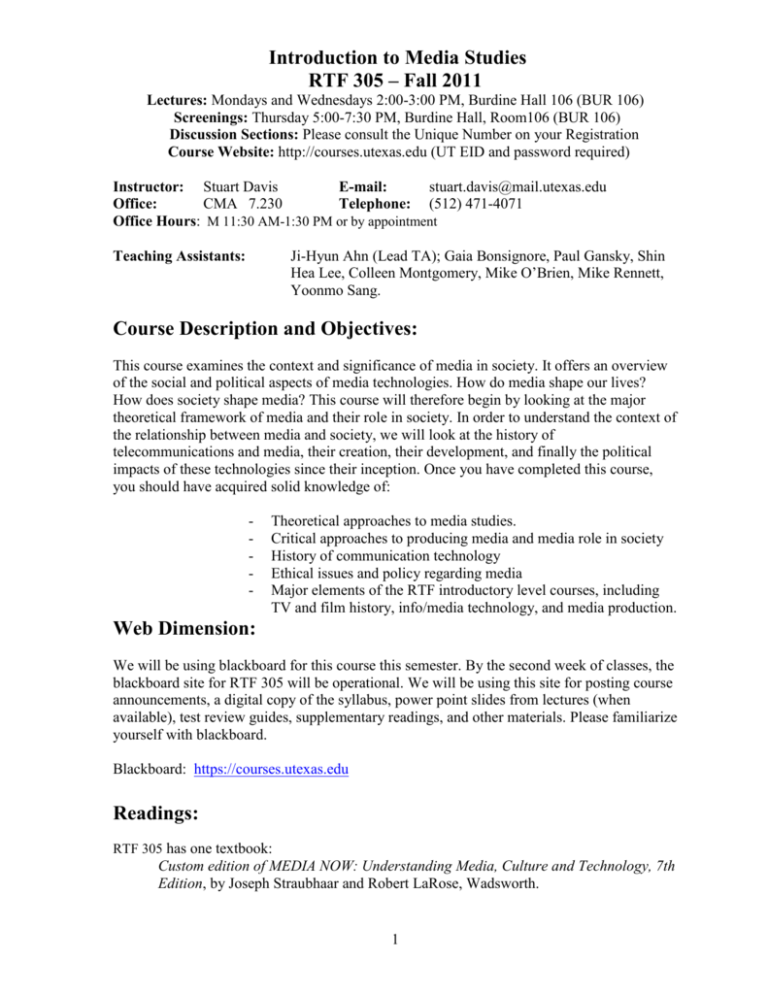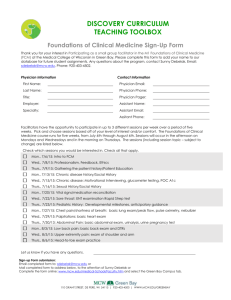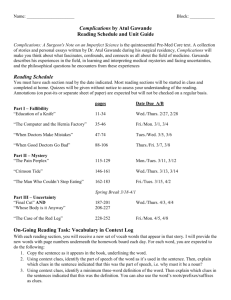Introduction to Media Studies
advertisement

Introduction to Media Studies RTF 305 – Fall 2011 Lectures: Mondays and Wednesdays 2:00-3:00 PM, Burdine Hall 106 (BUR 106) Screenings: Thursday 5:00-7:30 PM, Burdine Hall, Room106 (BUR 106) Discussion Sections: Please consult the Unique Number on your Registration Course Website: http://courses.utexas.edu (UT EID and password required) Instructor: Stuart Davis E-mail: stuart.davis@mail.utexas.edu Office: CMA 7.230 Telephone: (512) 471-4071 Office Hours: M 11:30 AM-1:30 PM or by appointment Teaching Assistants: Ji-Hyun Ahn (Lead TA); Gaia Bonsignore, Paul Gansky, Shin Hea Lee, Colleen Montgomery, Mike O’Brien, Mike Rennett, Yoonmo Sang. Course Description and Objectives: This course examines the context and significance of media in society. It offers an overview of the social and political aspects of media technologies. How do media shape our lives? How does society shape media? This course will therefore begin by looking at the major theoretical framework of media and their role in society. In order to understand the context of the relationship between media and society, we will look at the history of telecommunications and media, their creation, their development, and finally the political impacts of these technologies since their inception. Once you have completed this course, you should have acquired solid knowledge of: - Theoretical approaches to media studies. Critical approaches to producing media and media role in society History of communication technology Ethical issues and policy regarding media Major elements of the RTF introductory level courses, including TV and film history, info/media technology, and media production. Web Dimension: We will be using blackboard for this course this semester. By the second week of classes, the blackboard site for RTF 305 will be operational. We will be using this site for posting course announcements, a digital copy of the syllabus, power point slides from lectures (when available), test review guides, supplementary readings, and other materials. Please familiarize yourself with blackboard. Blackboard: https://courses.utexas.edu Readings: RTF 305 has one textbook: Custom edition of MEDIA NOW: Understanding Media, Culture and Technology, 7th Edition, by Joseph Straubhaar and Robert LaRose, Wadsworth. 1 Textbooks are for sale either at the University Coop OR through the Wadsworth/CENGAGE website: http://www.cengagebrain.com/shop/micro/utacampus. Once you enter the site, please find the “Select a Course” menu and scroll down to the page for RTF 305. Also, required for this course are some supplementary readings available in a course packet available at: Jenn’s Copy & Binding - 2518 Guadalupe (located at the intersection of Guadalupe and Dean Keaton - across from CMA). http://www.jennscopies.com There will also be some supplementary readings posted to the course Blackboard site or as hyperlinks provided on the course schedule in this syllabus. Student Responsibilities: By registering for this course, you agree to abide by the rules and regulations governing this class. Your responsibilities include but are not restricted to the following points: 1. All information stated in this syllabus in regards to your duties and responsibilities. 2. Any additional announcements provided in lectures and discussion sections as official notices. 3. Not talking in class. It is incredibly disruptive to fellow students. If this starts to become a serious problem, we will have to start ejecting students from lecture with points taken off your final class grade. 4. Attending all lectures, discussion sections, and screenings. Absences may be excused only if you have an official document that meets the University’s standards and regulations. Please do not leave lectures early. It greatly disrupts the flow of the class. 5. Reading and understanding the concepts in your reading prior to coming to class. Lectures and discussions will depend on your understanding of the concepts covered in the assigned reading. Be prepared to answer questions regarding your readings or lectures/screenings before coming to class. 6. Be on time! Arriving late to class will cause disruption to your classmates and the instructor. Do note that upon late arrival to the lecture or screening, the instructor reserves the right not to allow to you to attend class. Nevertheless, you will still be responsible for all information discussed in lectures. 7. The recreational use of any electronic devices is not permitted during class. Laptops may be used only if for note-taking purposes. 8. If you miss a class, it is your responsibility to get notes and find out what you missed from another student. 9. Lectures and discussion sessions are most likely to present information additional to that in your readings. You are responsible for all information presented in these meetings. 10. Completing and handing in all assignments during your discussion section meetings by the assigned date. Please note that late work will not be accepted. 11. The Instructor and Teaching Assistants will rely on Blackboard for making announcements and disseminating information. You are responsible for any class information posted on the RTF 305 Blackboard site <http://courses.utexas.edu>. 12. Additionally, e-mail will be the main communication tool. Please update your email on the UT system and keep up with any updates sent electronically. 2 Course Performance Assessment: Requirements Test I Test II Test III Discussion Section Attendance & Participation Written Assignment 1 Written Assignment 2 Re-Write of Assignment 1 or 2 Percent of Final Grade 20% 20% 20% 10% 10% 10% 10% Total 100% Grading Scale This course operates on the following grade scale: A AB+ B BC+ C CD+ D DF 92.5-100 89.5-92 87.5-89 82.5-87 79.5-82 77.5-79 72.5-77 69.5-72 67.5-69 62.5-67 59.5-62 0-59 Tests There will be three tests during the course of the semester. Each of these tests accounts for 20% of the total grade. These tests will include 40 multiple choice questions that cover materials taken in the course segment preceding each of them. Tests will therefore cover lectures, screenings and readings. Therefore, it is very important that you read your assigned texts on a weekly basis and before coming to class. Tests are NOT cumulative. ALL tests are required. No make-up tests will be allowed without official documentation as defined by the UT. Students with disabilities are required to present the appropriate documentation for special testing arrangements. Tests will be given during the weekly screening times on Wednesday evenings. Please make sure you come to the test early. Tests will be given at 5:00 pm. In order to prevent possible cheating, we have a policy where if you arrive after the first person has turned in his or her test, you will receive a 0 as your test grade. If you need to make up a test due to an officially documented reason, please contact your TA to schedule a time. Discussion Sections (Beginning September 12/13): 3 Discussion sections are held on Monday and Tuesday nights. Please check your registration to learn about your section’s unique number, meeting location and time. You must attend the section for which you are officially registered. Discussion section attendance will be taken each week (including your active participation) for a total of 10% of your final grade. If you arrive later than 10 minutes, you will be marked as absent. Unique # 07895 07900 07905 07910 07915 07920 07925 07930 Section # 1 2 3 4 5 6 7 8 07935 07940 07945 07950 07955 07960 9 10 11 12 13 14 07965 07970 07975 07980 07985 15 16 17 18 19 07990 20 07995 21 TA Mike O’Brien Shin Hea Lee Mike O’Brien Shin Hea Lee Yoonmo Song Paul Ganksy Shin Hea Lee Colleen Montgomery Yoonmo Song Mike Rennett Ji-Hyun Ahn Yoonmo Song Paul Gansky Colleen Montgomery Mike Rennett Mike O’Brien Ji-Hyun Ahn Paul Gansky Colleen Montgomery Gaia Bonsignore Mike Rennett Time M 5-6 pm M 5-6 pm T 5-6 pm T 5-6pm T 5-6pm M 6-7pm M 6-7pm M 6-7pm Location CMA A3.112 CMA A3.128 BEN 1.104 CMA A3.128 WEL 4.224 CMA A3.112 CMA A3.128 PAR 304 M 6-7 pm T 6-7 pm T 6-7 pm T 6-7 pm M 7-8 pm M 7-8 pm PAR 308 BUR 130 PAR 303 WEL 3.260 CMA A5.136 PAR 304 T 7-8 pm T 7-8 pm T 7-8 pm M 8-9 pm M 8-9 pm BUR 228 PAR 204 PAR 303 CMA A5.136 PAR 308 M 8-9 pm WAG 208 T 8-9 pm CMA A5.136 Writing Assignments You are required to complete two 4-5 page writing assignments throughout the semester. They will be due on the date indicated in the syllabus. Prompts will be disseminated via Blackboard approximately two weeks before the assignments are due. Your TA will discuss these assignments with you more in the weeks to follow. You will be permitted to re-write one of the papers in order to possibly receive a higher score. This re-write will count for the same amount as a paper and will be due on the Monday after the final exam (December 12, 2011). Office Hours Your TA will announce her/his office hours during section meetings. Your Instructor and TA are here to help and assist you either in understanding certain concepts relating to the course material or aid you with any questions you might have. As posted, my office hours are Mondays 11:30 am-1:30 pm in CMA 7.230. Email Communication with Instructor and TAs: 4 Please remember that your TA is your primary contact person for the class. They are responsible for your everyday participation in the course, assessing your papers, and helping prepare you for tests. Therefore, it would be wise to contact them with any potential problem before you contact the instructor. While we will be using Blackboard for official email announcements, you will not be allowed to use the “class email” function on the site to email everyone in the class. We have had problems in past semesters with this, and do not want to repeat them. For each time a student uses the Blackboard “class email” function to write the entire class, a point will be deducted from the student’s final course grade. Students with Disabilities: Any student with a documented disability who requires academic accommodations should contact Services for Students with Disabilities at 471-6259 (voice) or 232-2937 (Video Phone) as soon as possible to request an official letter outlining authorized accommodations. For more information visit: http://www.utexas.edu/diversity/ddce/ssd/. Scholastic Dishonesty: The University of Texas at Austin defines academic dishonesty as cheating, plagiarism, unauthorized collaboration, falsifying academic records, and any act designed to avoid participating honestly in the learning process. Scholastic dishonesty also includes, but is not limited to, providing false or misleading information to receive a postponement or an extension on a test, quiz, or other assignment; copying other people's work into your document, pretending it is your own; and submission of essentially the same written assignment for two courses without the prior permission of the instructor. By accepting this syllabus, you have agreed to these guidelines and must adhere to them. Scholastic dishonest damages both the student's learning experience and readiness for the future demands of a work-career. Students who violate University rules on scholastic dishonesty are subject to disciplinary penalties, including the possibility of failure in the course and/or dismissal from the University. For this class specifically, we will give you a zero for the assignment or test grade for the first infraction, lower your course grade by one grade point for the second, and fail you in the class for any further infractions. During test sessions, we will be closely monitoring student behavior. Please do not talk to your neighbor under any circumstances. The first offense will be punished with a verbal warning. Any subsequent offenses will result in expulsion from the testing space and a 0 on the test. For more information on scholastic dishonesty, please visit the Student Judicial services Web site at http://www.utexas.edu/depts/dos/sjs/. Writing Assistance: The Undergraduate Writing Center is located in FAC 211, phone 471-6222. The Center offers individualized assistance to students who want to improve their writing skills. There is no charge utilizing this service. Students may come in on a drop-in or appointment basis. 5 Student Athletes: At the beginning of the semester, student athletes and participants of other university-sponsored organizations who will miss class due to university-sponsored commitments must see the instructor and present a letter from the athletic department or appropriate sponsoring office. Class Schedule: Readings in your text and course packet are labeled chronologically with each of the lecture topics/screenings below. This schedule is subject to revision if necessary. If changes are made, you will be notified in class and/or via Blackboard. RTF 305 FALL 2011 COURSE CALENDAR DAY Wed Thurs Mon DATE 8/24 8/25 8/29 Wed 8/31 Thurs Wed 9/1 9/7 Thurs 9/8 Mon 9/12 MonTues 9/129/13 Wed 9/14 Thurs 9/15 Mon 9/19 Wed 9/21 SUBJECT Introduction Screening Media Theories 1: Technological vs. Cultural Determinism, Political Economy, Hegemony Media Theories 2: Approaches to Studying Media and Media Effects Screening Race, Ethnicity, and the Media (RTF 316 M) Screening TEXTBOOK Chapter 1 Media Regulation: Policy and Law DISCUSSION SECTIONS BEGIN Chapter 15 Advertising and Advertising Cultures Screening History of Mass Media: Radio/early television History of Mass Media: Contemporary Television PACKET Bus 174 Chapter 2 (30-47; 4951) Croateau & Hoynes, “Media and Ideology” Chapter 14 Tough Guise/Killing Us Softly Mad Men (Selected Episodes) Please consult your Blackboard registration information Chapter 11 I Love Lucy, Arrested Development, 30 Rock (Selected Episodes) Chapter 6 Chapter 7 6 Spigel, “Installing the TV Set” Thurs Mon 9/22 9/26 Screening History of Mass Media: Music Wed Thurs Mon Wed 9/28 9/29 10/3 10/5 Test Review Test 1 Film History 1 Film History 2 Thurs Mon 10/6 10/10 MonTues Wed Thurs Mon 10/1010/11 10/12 10/13 10/17 Screening Introduction to Film Analysis 1 (Professor Charles RamirezBerg) Paper 1 Due in Sections Wed 10/19 Thurs Mon 10/20 10/24 Wed Thurs day Mon 10/26 10/27 Film Analysis 2 Screening Film Analysis 3 (Alternative Narratives) Introduction to Producing Films in RTF (Timothy Edwards) Screening Introduction to Documentary Filmmaking Introduction to Screenwriting Screening 10/31 Introduction to Audio Design Wed Thurs Mon 11/1 11/2 11/7 Wed 11/9 Thurs Mon 11/10 11/14 Test Review Test 2 History of the Internet 1: Early Computers and Plugging In History of the Internet 2: The Rise of Mobile Platforms Screening History of the Internet 3: Social Media and Social Networks Wed 11/16 Thurs Mon 11/17 11/21 MonTues Wed Thurs 11/2111/22 11/23 11/24 History of the Internet 4: Digital Cultures Screening Media and Globalization 1: Cultural Imperialism Paper 2 Due in Sections Cadillac Records Chapter 5 Test 1 Chapter 7 Schatz, “The Studio System and Conglomerate Hollywood” Casablanca Adaptation Ramirez-Berg “A Taxonomy of Alternative Film Plots” Capturing the Friedman’s/High School (excerpts) Aristotle, “The Poetics” TBA Thom “Designing for a Sound Film” Test 2 Chapter 9 Chapter 12 The Social Network Christakis and Fowler, Connected: The Surprising Power of Social Networks and How They Change our Lives (selection) Saludos Amigos/Disney Educational Films Miller et. al, Global Hollywood (selections) NO CLASS NO CLASS-THANKSGIVING 7 Mon 11/28 Wed 11/30 Thurs Mon 12/1 12/5 Wed 12/7 Thurs Mon 12/8 12/12 Media and Globalization 2: Hybridity, Cultural Proximity, and Localization Media and Globalization 3: Alternative Media and Global Social Movements Chapter 17 Cleaver, “The Zapatista Effect”. Available at http://libcom.org/library/zapatistaeffect-cleaver Screening Globalization and Media 4: The Case of Al Jazeera (RTF 312) Test Review and Course Evaluations TEST III Optional Re-write Due The Control Room TEST III 8






